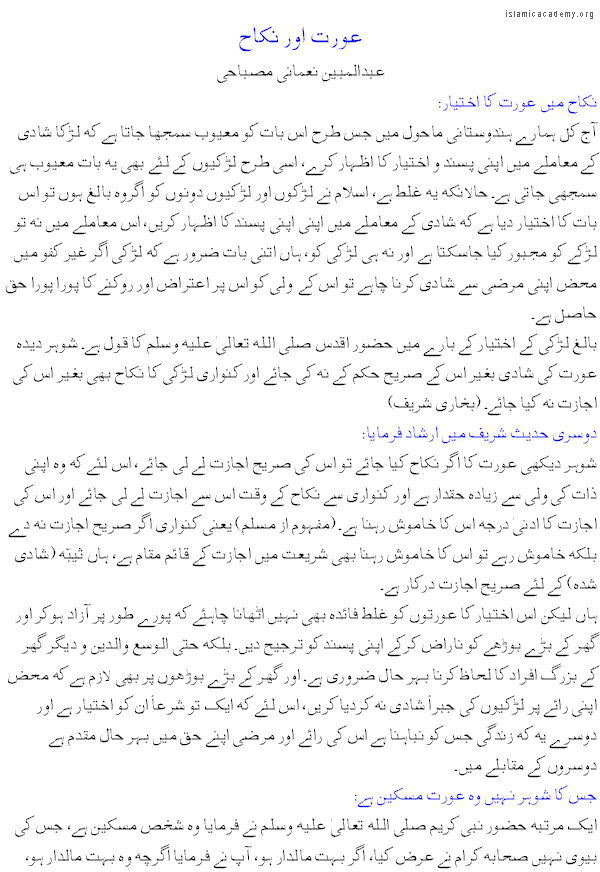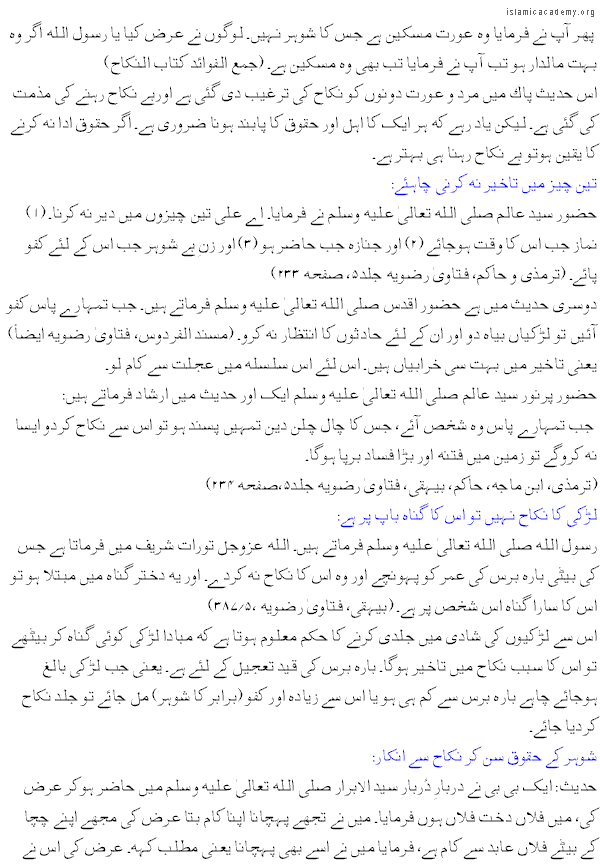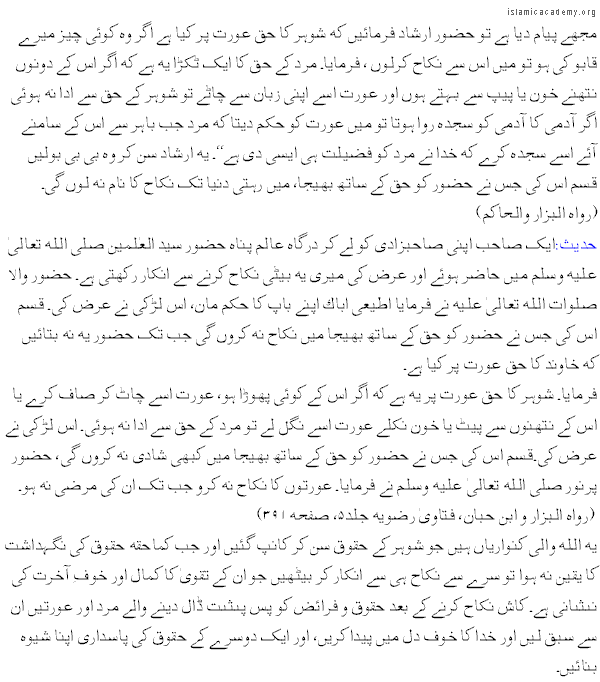Some relevant points to be noted are:
1. Engagement or Mangni does not qualify the future spouses to go out together, even if the parents consent. Man and woman become permissible for each other only after the performance of Nikah.
2. Dowry
The unislamic system of demanding and accepting dowry must be avoided at all costs. Shariah does not make any expense incumbent on the bride/bride's parents. Even the marriage expenses, it is recommended are to be borne by the bridegroom.
However, the bride can bring whatever she wants of her free will, and it will always belong to her.
3. Other Unislamic Customs
Many other unislamic customs have crept into the marriage ceremony of some Muslims. These customs are either borrowed from non-Muslim cultures or continue because they are established in past generations. One must avoid them if they are against the Shariah, even if some people are displeased. Other customs like the breaking of coconut etc. also do not feature among the Islamic rituals. All actions, customs etc. which show disrespect to Islam or weaken the importance of Islam have to be avoided.
4. Haraam Acts
Some of the rituals in marriage ceremonies are absolutely haraam like the playing of music. It is also haram for ladies to go for mixed gatherings without proper hijab. Such things invite divine wrath and take away the blessings of this auspicious occasion.
In the Islamic Law, marriage is an 'aqd, a contract. The components of this contract are as follows:
A. Proposal
In Islam the process of proposal by a man to a woman for her hand in marriage, or for that matter, to her family, is encouraged. Islam considers this natural, and recommends it as an act of respectability and dignity for women.
B. Mahr
And the intending husband is asked to offer a Mahr to the bride.
The Quran says,
And give women their Mahr as a free gift, but if they of themselves be pleased to give up to you a portion of it, then eat it with enjoyment and with wholesome result. [28]
The following points are worthy of consideration:
· Mahr must be agreed upon by the marrying partners themselves, not by parents.
· Mahr is her right, to which her husband remains indebted.
· It is a free gift and not her price.
The Mahr may be cash, kind or non-material (like training or teaching something). It can be paid up front or can be in form of promise to pay upon demands decided prior to the solemnization of marriage.3 Moajjal (immediate), Muwajjal and Indat-talab (on demand).
However, it is much recommended to pay it before or at the time of Nikah itself.
C. The Nikah Ceremony
According to Shariah, the wife-to-be says, 'An Kah'tu nafsaka a'lal mah'ril ma'loom'
“I have given away myself in Nikah to you, on the agreed Mahr.”
Immediately, the man (bridegroom) says, 'Qabiltun Nikaha'.
“I have accepted the Nikah.”
With these pronouncements, they become husband and wife.
If the marrying partners are not able to recite the formula in Arabic, one or two persons or priests
[29] are appointed and authorized to officiate. One who represents the bride would first seek her explicit consent to officiate on her behalf, and so would the other who acts on behalf of the groom. Naturally, there would be a slight variation in the pronouncements, because the persons reciting them are appointees. A person who represents the bride would initiate by saying, “Ankah'tu muwakkilati muwakkilaka a'lal mah'ril ma'loom.”
“I give away in Nikah the woman who has thus appointed and authorized me, to the man who has authorized you, on an agreed Mahr.”
The groom's representative would respond, “Qabiltunnikaaha limuwakkili a'lal mah'ril ma'loom.”
“I accept the Nikah on behalf of the one who has appointed me, on the agreed Mahr.”
It is mustahab to recite a brief discourse or Khutba before the Nikahformula is enunciated. In this Khutba, Allah is praised for His Wisdom in regulating the lawful process of procreation, and then the traditions from the Prophet (s.a.) are also recited.
D. Time of Marriage Ceremony
Though basically marriage is allowed at all times, there are some days on which marriage is not recommended; some of these are based on ahadithand some on cultural, historical reasons.
Generally, we can categorize these days into three: (a) There are someahadith which say that it is makruh (not recommended) to have a marriage ceremony on the days when the moon is in the constellation of Scorpio (this is known as al-qamar fil aqrab or qamar dar aqrab), during the last two or three days of the lunar months, and on Wednesdays. (b) There are certain days of the Islamic calendar which have become associated with the early events of the Islamic history; for example, the 10th of Muharram is the day of mourning for the massacre at Karbala or the day of the Prophet's death in Safar, etc. Since such days are commemorated by the Muslims as days of mourning, it is socially and, to some extent, religiously not recommended to have a marriage ceremony on such days.3
The Shia Ithna Ashari (Twelver Shias), especially in India and Pakistan, rarely perform marriage ceremony between the 1st of Muharram and the 8th of Rabi al-Awwal as this period includes the mourning days of Muharram culminating in the martyrdom of Imam Askari (a.s.). The 9th Rabi al-Awwal is celebrated as Eid-e-Zahra.
If there is a need, however, Nikah, can be performed at any time.
E. Permission of the Bride-to-be/Father
The girl's consent is necessary and has to be taken by her representative, directly.
In case of a virgin/spinster the father's or the grandfather's permission is also necessary. However if the permission is unreasonably withheld under some conditions or the girl has no father/paternal grandfather it is not necessary.
However, a woman who is not a virgin, does not require any permission in case of remarriage.
F. Valima (Dinner)
Valima is highly recommended on the groom. The relatives, neighbours and friends must be invited for Valima. However, lavish spending is not advisable especially when the same money can be used effectively by the couple.
Notes:















